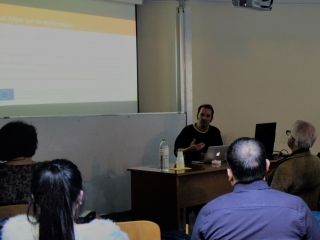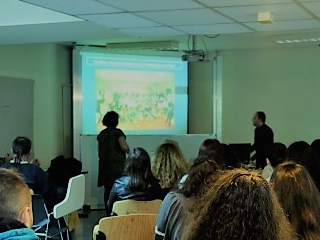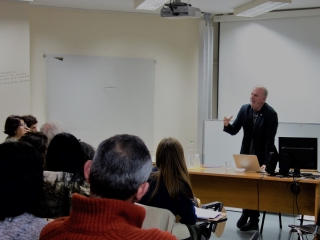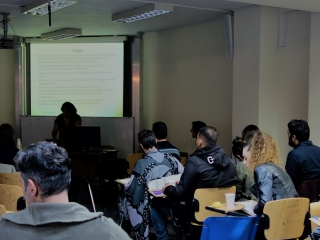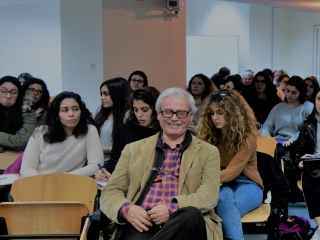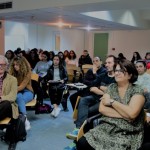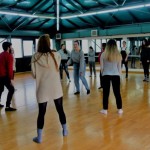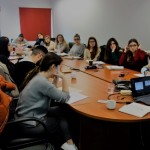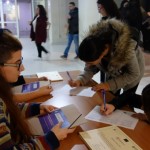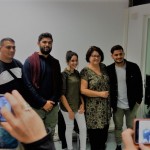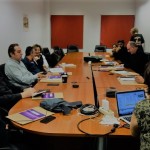Training of Police / Prison Officers
- Written by Χαρούλα Σταθοπούλου
- Published in Police/Prison Officers
- Permalink

During last September, five project workshops for police and correctional officers were designed and implemented by COSPIROM members. The purpose was intercultural communication training. In more detail, the issues that were discussed concerned: stereotypes and prejudices, the identities of dominant and vulnerable groups – with an emphasis on Roma – and the need to develop intercultural skills and active citizenship. The trained police and correctional officers will then participate in scheduled meetings with young Roma, aiming to promote equitable and meaningful interaction (common spaces).
Here is a brief description of the content of the above workshops.
1st Workshop: Stereotypes and prejudices. From theory to practice
Given that stereotypes and prejudices constitute the main reasons that lead to the development of discrimination as well as racist perceptions and attitudes, the seminar will analyze the basic theoretical approaches focusing on the reasons and ways of developing stereotypical perceptions and behaviors. Reference will be made to the social theory of internal and external groups as well as issues related to the development of social comparison, social mobility and social exclusion.
Studying typical case studies will highlight the ways in which stereotypically constructed views influence social interaction and often lead to negative individual and collective attitudes on the part of both majority and minority groups.
2nd Workshop: Dominant and vulnerable groups – Majority and minority identities
The meeting between majority members and members of a minority group typically bears the characteristics of a socially mediated encounter, in the sense that the setting and dynamics of each particular communication interaction are directly or indirectly influenced by socially dominant constructions / images of the self “And the” other “. As a rule, these meetings function as a ‘confirmation’ process of the characteristics of each group, thus reproducing their existing social status and consequently their asymmetric social relations. Taking into account the theoretical framework of Social Identity Theory (Tajfel), the main objective of the workshop is to enable participants to reflect on the role that majority identities play in defining / constructing minority identity and its implications for the process of reproducing unequal social relationships. Furthermore, It will be attempted to make clear that the above procedures trap members of minority groups in social positions with extremely limited opportunities for social action and participation. The ultimate goal is for the workshop to contribute to the construction of the communication skill of empathy, by recognizing the role that majority members play in the constraints that minority members face.
3rd Workshop: Roma: Multiple readings of a vulnerable identity
The term Roma is used not to cause silence but to be recognized as the cultural diversity of a particular ethnotic group. In many cases, the way cultural diversity of an ethnotic/ minority group in conditions of asymmetric social relations is understood, can lead to misunderstandings. This is when the diversity of the minority group is attributed to a static character. In this case, the Roma are perceived as a culturally solid and homogeneous group. The main negative consequences of this perception include the following: Cultural differences to the majority group appear to be absolute and unbroken – a perception that strengthens rather than weakens social distances between majority and minority – and (b) a socially sensitive understanding of the variety of subjective perspectives that make up the reality of members within the group is prevented. The purpose of the workshop is to look inside the group, recognize its intercultural diversity and raise awareness of the persons and their stories behind the “Roma” label.
4th Workshop: Intercultural skills as a key feature of functional social coexistence
Intercultural competence and empathy are now considered amongst the dominant skills that the modern citizen is required to possess. The degree of intercultural competence of citizens constitutes a regulating factor of functional social coexistence especially in the context of modern multicultural societies. The seminar will introduce the concepts of intercultural competence and empathy and will give typical examples of individual and collective ways of thinking and behaviors related to the above skills.
5th Workshop: Approaching active citizenship issues
Who is considered an ‘active citizen’ today? How is the role of the active citizen linked to issues of social activism? How is social activism defined and what is the role of the police in this definition? The above questions will form the core of the discussion that will take place during the seminar. The concepts of active citizenship, social justice, social activism and others are contemporary concepts with many different interpretations and readings. The above concepts will be discussed in the seminar, while examples and case studies will attempt to show the relationship between these concepts and the role of social institutions in Greece and abroad.


